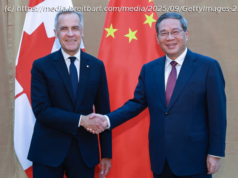China may stop buying US Treasury securities. Or it may not. That’s what we learned last week from two very different stories that I will tell you about in a…
China may stop buying US Treasury securities. Or it may not.
That’s what we learned last week from two very different stories that I will tell you about in a moment.
The most important thing to note is: No matter which story is correct, we now understand just how important of a hold Beijing has over Washington and Wall Street.
We also know how our government’s inability to control spending has made the future of this country very complicated and has condemned us to being dependent on people we might not want to depend on.
Our Declaration of Independence has been repealed, so to speak.
Story No. 1, on Wednesday, was a Bloomberg News report that “senior government officials in Beijing reviewing the nation’s foreign-exchange holdings have recommended slowing or halting purchases of US Treasuries, according to people familiar with the matter.”
That’s pretty clear cut. And pretty dire for our economy. The Chinese own $1 trillion-plus of US debt that has helped fund all the programs we hold dear. And, along with the Federal Reserve, it’s kept interest rates low.
The only thing worse — like disastrously bad — would be if the Chinese were going to sell US bonds.
Enter Story No. 2. On Thursday, Reuters said, “Report on China Slowing US Bond Purchases May Be ‘Fake,’ Regulator says.”
It started: “A report that China is considering slowing or halting purchases of US Treasury bonds may be based on erroneous information and could be ‘fake,’ the country’s foreign exchange regulator said.”
The State Administration of Foreign Exchange, in other words, said Story No. 1, from Bloomberg, might have used the “wrong source of information or may be fake news.”
First off, it’s good to know that President Trump’s concept of fake news is relevant in that part of the world. The concept travels well.
But there are so many other possibilities.
The Bloomberg story could have been a trial balloon by Chinese officials. Or, China may have decided after the Bloomberg story that it was unwise to tip its hand on its bond plans since the price of US Treasurys declined on the Bloomberg story. And that caused the value of China’s bond holdings to fall.
Or, one Chinese hand might not know what the other is doing. Maybe Bloomberg’s source was better than Reuters’ source.
Or vice versa.
Now that I’ve purposely confused you, here’s the only point that matters: People on Wall Street, rightfully, cared about these stories more than almost anything that happened last week.
Why? Because Washington has put us in a precarious spot. Every move it makes — from tax law changes to the budget talks that might shut the government to infrastructure reform — is affected by our huge debt levels.
Plus, we are too much in debt to the wrong countries and organizations that don’t necessarily have our best interests in mind — like OPEC and the Chinese.
Are we going to have to ask permission from the Chinese to take action against North Korea? And will Beijing penalize our bond market and hurt our economy if we don’t ask?
Will OPEC someday sell its holdings of US bonds if Washington decides on an energy policy that might make us independent of Middle East oil?
Those two stories that were battling for attention last week are about nothing less than the sovereignty of the US government.






